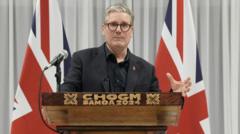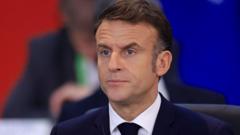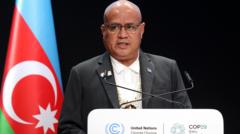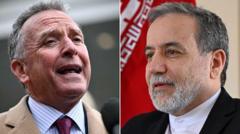Commonwealth leaders unanimously agree on the necessity for a reparations dialogue regarding the slave trade, although the UK government remains firm in its refusal to discuss monetary compensation.**
Commonwealth Leaders Push for Reparations Dialogue Amid UK Reluctance**

Commonwealth Leaders Push for Reparations Dialogue Amid UK Reluctance**
A recent Commonwealth summit in Samoa sparks discussions on reparations for the slave trade, despite the UK's position against financial compensation.**
Commonwealth leaders have expressed unity on the importance of initiating a dialogue about reparations for the transatlantic slave trade during their recent two-day summit in Samoa. This statement emerges despite the UK's explicit desire to exclude the topic from discussions. The joint document, signed by 56 heads of state, emphasizes the need for a "meaningful, truthful and respectful conversation" regarding reparatory justice for the historical injustices associated with slavery.
While UK Prime Minister Sir Keir Starmer acknowledged the discussions, he stressed that financial reparations were not on the agenda, asserting, “Our position is very, very clear” against monetary compensation. Amid escalating calls from Commonwealth nations for a formal apology and reparations for the UK's involvement in the slave trade, leaders at the summit maintained focus on a variety of subjects—including resilience and climate issues—throughout their conversations.
Prior to the summit, UK officials had downplayed the significance of reparations in the preparatory talks. Following the conclave, which spanned an extensive six hours, Starmer clarified that reparations were a minor part of the overall agenda, which featured “one paragraph in 20-something paragraphs.” Nevertheless, the statement allows advocates of reparations to claim that the conversation will continue, while the UK government reaffirms its stance against financial reparations.
Frederick Mitchell, the Bahamas’ foreign minister, indicated optimism for future discussions on reparations during the next UK-Caribbean forum scheduled for March in London. He voiced expectations that UK financial assistance may eventually materialize alongside reparations. Prompted on the vagueness of the joint statement, Mitchell expressed, “Behind the language is an attempt to go in a particular direction,” highlighting the underlying intentions of the discussions.
As conversations about reparatory justice loom, officials anticipate it will be a central agenda item at the next Commonwealth summit in two years. In 2023, a United Nations judge concluded that the UK potentially owes over £18 trillion in reparations for its role in slavery across fourteen Caribbean nations. This support for reparations is represented by incoming Commonwealth Secretary-General Shirley Ayorkor Botchwey from Ghana, who underscores the required efforts and initiatives moving forward.
The reparations could take varied forms, ranging from financial compensation to formal apologies, educational outreach programs, or public health support, reflecting a diverse approach to addressing historical grievances.





















